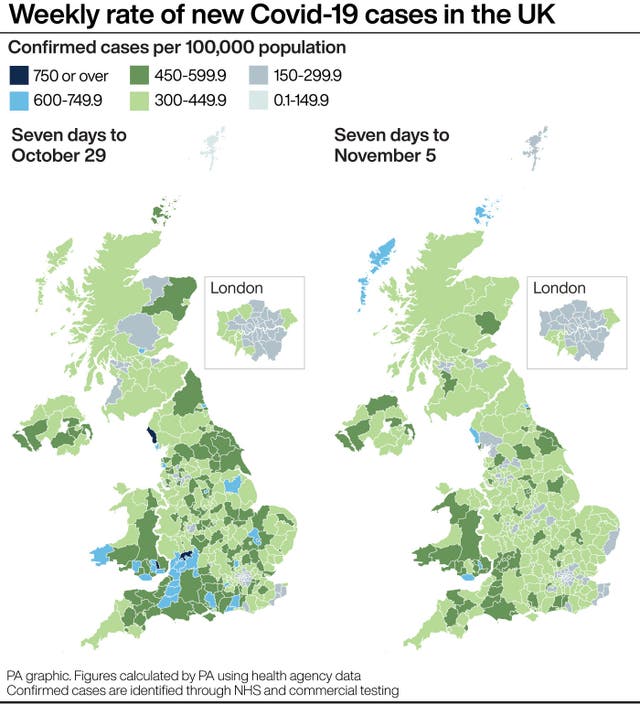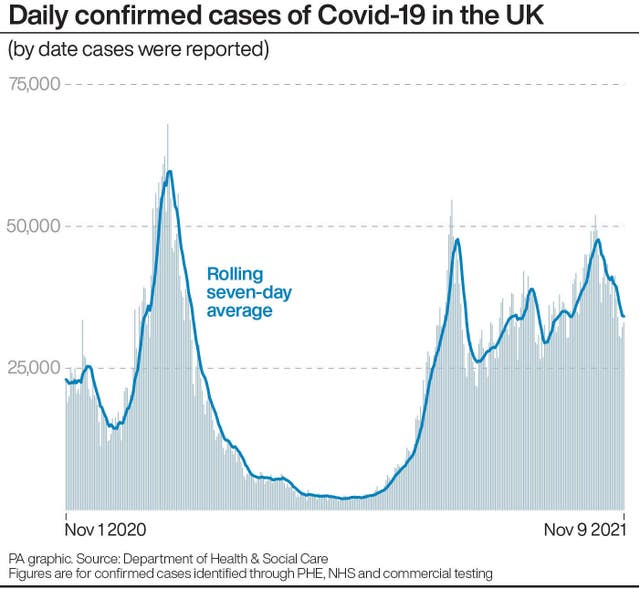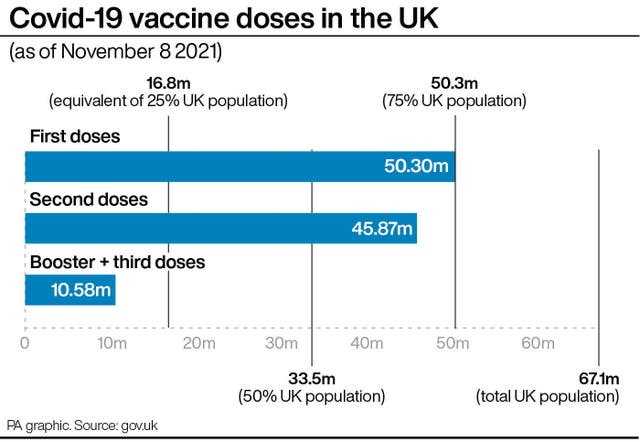
The Health Secretary has said he does “not want to see anyone have to walk away from their job” as he urged health and social care staff to get a Covid-19 vaccine.
Sajid Javid said the decision to make vaccines compulsory for staff in England from next April was “about patient safety”, adding that it was the Government’s and NHS’s duty to protect the vulnerable, who are at increased risk of death from coronavirus.
Mr Javid told LBC Radio: “The vast majority of NHS workers are already vaccinated and I want to, of course, thank them for that.
“They’ve done that not only to protect themselves or their colleagues, most of all I think they’ve done it to protect their patients.
“We know that people in hospital, they’re already very vulnerable, and the last thing they want is to be exposed to Covid-19 when it could have been prevented, and that can be fatal for them in that condition.

“I think, ultimately, this is the right call – it is the duty of the NHS and the Government to do everything that we can to protect vulnerable people.”
Mr Javid said staff who refuse a jab could be moved to non-patient facing roles, but that figures in the Government’s impact assessment regarding how many could leave were a “cautious estimate”.
He told Sky News: “I don’t want to see anyone lose their job, I don’t want to see anyone have to walk away from their job.
“I just do think it is important to be doing everything we can, because also what I don’t want to see – most of all what I don’t want to see – is someone … that’s vulnerable being exposed to Covid when it could have been prevented, and perhaps they might even die from that, and I think that would be totally unacceptable.”
He was backed by Danny Mortimer, chief executive of NHS Employers and deputy chief executive of the NHS Confederation, who said a “majority of NHS leaders do understand and do support the mandation of the Covid vaccine”.

Mr Mortimer said the coming months must see a focus on engagement and education of NHS workers around “misunderstandings” about the coronavirus vaccine.
He told Times Radio: “Clearly, what we need to focus on between now and April is talking to people, engaging with them.
“If there are misunderstandings or misapprehensions about the vaccine, reassuring people, educating them, and that’s the job of the next four or five months.”
He added: “Any situation where we lose people just puts extra strain on services and I think, as the Government acknowledged in its own impact assessment, risks impacting on service delivery.
“We only have so many people and that may impact on what we can do, but as I’ve said, one step at a time.
“The issue now is to focus on engaging with people and trying to persuade them and explain to them the benefits to them and their families, as well as to their colleagues and patients, of having the vaccine.”
Elsewhere, Dr Maggie Wearmouth, who sits on the Joint Committee for Vaccination and Immunisation, said that legislating mandatory vaccines was a “blunt instrument” but she supported it.
She told LBC: “I’m broadly in favour of this move. I think legislation is a blunt instrument, but as frontline health and social care workers our goal and our main responsibility should be the health and protection of the very vulnerable, frail and elderly patients in our care.
“As a frontline health worker myself, I find it incomprehensible that someone would want to work in a job like mine and wish not to be vaccinated, so I broadly support it.”
Asked about the prospect of daily testing as an alternative to unvaccinated staff, she added: “Daily testing is really quite cumbersome. I test twice a week and that’s bad enough.

“I do think that you make a choice if you’re a frontline worker, and the choice should be to protect your patients.”
However, she said pregnant women and those who are planning to become pregnant are her main concern, adding. “The most often reason that’s quoted to me are women who don’t want to have it because of pregnancy.
“I think that raises double concerns because we know that only 15% of women who are pregnant are fully vaccinated, so for frontline workers, I think it’s extremely important that these people are educated and helped and supported by their midwifery teams to get vaccinated for themselves, their unborn babies, their staff, colleagues and their jobs.”
Government estimates published on Tuesday show that more than 120,000 frontline health and social care staff in England could lose their jobs next spring if they refuse to have Covid-19 vaccines.
The Government document warned the policy could have a “significant impact” on the health and care workforce, with estimates suggesting that as many as 123,000 could leave their jobs as a result.
"I have concluded that all those working in the NHS and social care will have to be vaccinated."@SajidJavid sets out the action being taken to protect health and social care workers, their colleagues and patients from #COVID19.
More: https://t.co/En9nK259SH pic.twitter.com/Zx7dfd5WZ1
— Department of Health and Social Care (@DHSCgovuk) November 9, 2021
It estimated that by the end of the grace period about 88,000 health workers, including 73,000 NHS staff, and 35,000 social care workers will remain unvaccinated.
Any reduction in the workforce “may lead to reduced or delayed services”, with the NHS already facing a record backlog of care and grappling with high vacancy rates.
Estimates included in the document suggest that around 54,000 unvaccinated staff will take up the offer of a jab as a result of the policy.
The new rules apply to health and wider social care settings that are regulated by the Care Quality Commission (CQC).
Mr Javid has said that only those who do not have face-to-face contact with patients or who are medically exempt will not be required to have two doses of a Covid jab.


Comments: Our rules
We want our comments to be a lively and valuable part of our community - a place where readers can debate and engage with the most important local issues. The ability to comment on our stories is a privilege, not a right, however, and that privilege may be withdrawn if it is abused or misused.
Please report any comments that break our rules.
Read the rules hereLast Updated:
Report this comment Cancel